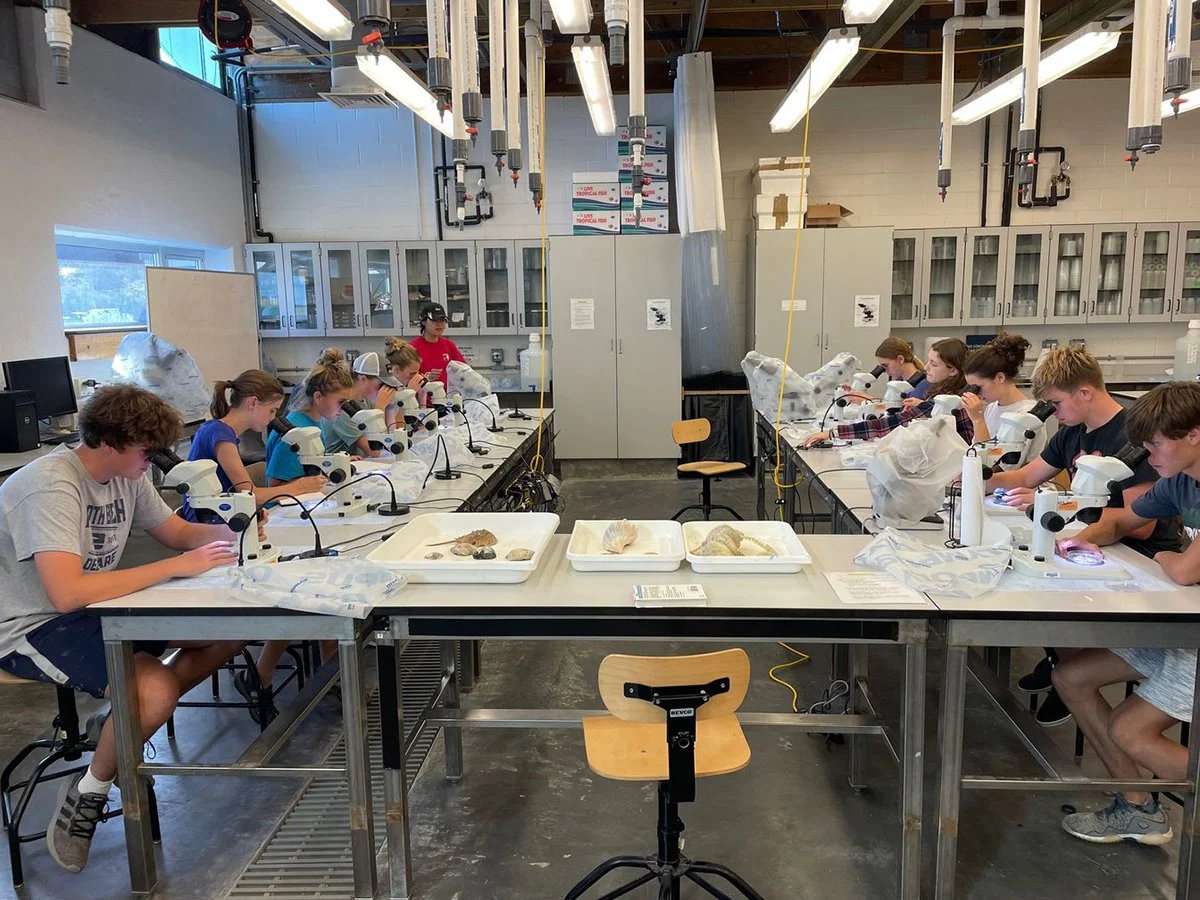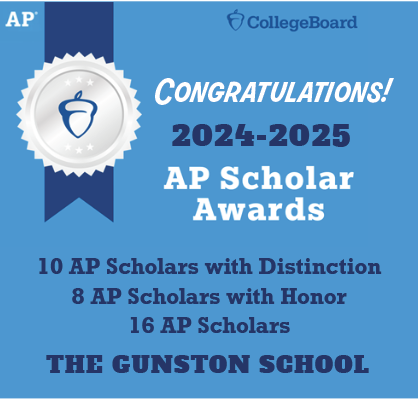
Academic Program
Academic Program
The fully-accredited Chesapeake Watershed Semester is a unique opportunity for motivated high school juniors and seniors, as well as gap year/postgraduate students to join a talented community of learners. Students will immerse themselves in the study and restoration of the Chesapeake Bay for one semester. Through dynamic and diverse field-study Expeditions, we travel the region meeting with community members and conducting research. While in residence on our waterfront campus, you will take honors and AP level classes while maintaining an intense, hands-on engagement with the natural environment.
Mindful of the academic impact of both entering CWS, the program has been designed for students as a rigorous college preparatory program that integrates smoothly with a diverse range of sending high schools, and Gunston’s academic team works closely and tirelessly with sending schools to ensure that scheduling issues are resolved and credits transfer seamlessly.
Academic Core
All Students will take the following semester-length courses:
Environmental Science & Restoration Ecology (AP Environmental Science option)
Environmental Policy and Politics (AP Government option)
Literature of Land and Water (AP Literature option)
Leadership Seminar
Additional Academic Course Offerings (depending on student credit needs and placement)
Mathematics
World Language
Art (visual arts are integrated into all elements of the CWS program. However, students who wish to take art as a standalone elective work with the CWS Director to ensure an appropriate placement)
Semester Overview
Each Chesapeake Watershed Semester is approximately 15 weeks in length. The semester is divided into three types of learning structures:
Classroom and Campus Experiences
Single Day Expeditions
Residential, Extended Expeditions
Extended Expeditions are typically two to four nights in length and occur every two to three weeks. They’re built around an interdisciplinary unit of learning that the students focus on before and after the trip. For example, in late October, the students visit the Anthracite Coal Region in Central Pennsylvania to explore the lingering effects of coal mining on the Chesapeake Bay Watershed, and the unit of learning leading up to that expedition focuses on general land and energy use in the watershed.
Single Day Trips and Guest Speakers also dovetail with the interdisciplinary units of learning. The Chester Riverkeeper may come and visit the class for one period to discuss the stormwater management challenges that face the Chesapeake. Or, students may interview the Mayor of Annapolis about environmental engineering and legislative challenges for the city in association with impacts of climate change and sea level rise. As part of their environmental science course, CWS students explore the tributaries of the Chesapeake using the mobile kayak trailer and sixteen kayaks that Gunston uses for water-based field trips.
Finally, and consistent with the academic rigor of the program, students explore thematically-associated academic coursework in the Chesapeake Watershed Semester’s Cliff House classroom overlooking the Corsica River or outdoors on Gunston’s 75-acre campus.
Course Descriptions
-
The Chesapeake Bay is the largest estuary in the United States and home to 17 million people. In this course, we investigate the pieces, patterns, and processes that affect the health of the Chesapeake Bay. Historical threats such as sedimentation, eutrophication, and land-use remain while climate change and sea-level rise are increasingly important. In laboratory and field studies, students will build a robust toolbox of primary research techniques. This course can be combined with another semester of Environmental Science to prepare students to take the College Board’s Advanced Placement exam in the spring.
-
In classroom discussions, conversations with community members, research-based projects, debates, and the study of specific environmental cases, students achieve a deep understanding of the American constitutional system and environmental politics. This class will help students to discover the multiple levels at which environmental policy operates. Students will meet with local, state, national, and international environmental leaders. By exploring their own beliefs and political voices, students will cultivate empathy and an awareness of contemporary place-based environmental issues and policies. This course continues into another semester of United States Government & Politics to take the College Board’s Advanced Placement exam in the spring. THIS COURSE MEETS THE MARYLAND STATE GRADUATION REQUIREMENT FOR ½ CREDIT OF AMERICAN GOVERNMENT.
-
This course explores how American literary traditions have shaped our interactions with the land and water. Students will read, discuss, and reflect upon both fiction and nonfiction work. Ranging in scope from nineteenth-century Transcendentalism to modern-day environmental poetry and memoirs, the curriculum encompasses numerous authors and genres and explores the diverse ways in which Americans have defined nature. The course also provides a forum for students to make connections between CWS classes and narrate their personal journeys throughout the semester via a reflective journal and a water color journal.
-
The hallmark of the Chesapeake Watershed Semester is the cross-disciplinary research project that each student completes. Students work with teachers and mentors from the community to design their research topic, and then engage in a deeply rigorous research process. Part of the research process includes reaching out to experts in the community, so the students can achieve an ‘on-the-ground’ perspective on their research project. The interviews with mentors deepen students’ understanding of the field of study and push them to think about their topic in new ways. For students over the course of the Chesapeake Watershed Semester, as research topics develop and questions become clarified, the capstone project evolves into a passionate exploration of the topic that inflects how many students think about their college careers and beyond.
The final product includes a deeply researched paper and the public presentation of the research work.
Recent Capstone Research Projects have explored:
Deforestation’s impact on the Chesapeake Bay
Oyster aquaculture research
Eco-Arts Impact on Human Views of the Environment
The Impact of Population Growth & Urbanization on the Chesapeake Bay
How the Maritime Industry has Changed the Bay
Cultural Conceptions of Climate Change on the Islands of the Chesapeake
Potomac Horse Fever & Climate Change
Lost Islands of the Chesapeake
The Importance of Sharks in the Chesapeake Bay
The History & Predicaments of Chesapeake Bay Watermen
The Musical Tradition of the Chesapeake
The Influence of Menhaden in the Chesapeake Estuary
-
All students participate in an integrated, skills-based leadership course. The course begins with a field Expedition to strengthen group dynamics and explore leadership capacities and concludes with students presenting their Capstone Project. Through weekly conversations and guest presenters, students explore the character and qualities of great leaders, learn to lead effective teams, and explore how to lead in their personal and academic lives.
-
Depending on the credit needs of incoming students, and given the diverse math and world language placements of each cohort of CWS students, we work closely with each student to ensure that CWS students can earn appropriate credit in Math and World Languages, during the program. The CWS schedule includes scheduled “learning blocks” where students complete their work in these subjects.
Students in Algebra II and Pre-Calculus may enroll in those courses taught by an on-campus Gunston math instructor. Students wishing to take other math classes will be enrolled in courses offered through accredited online partnerships, with progress monitored by an on-campus faculty member.
World Language instruction is offered in partnership with the Gunston World Language Department.
***Important Note***
For Gap Year and Post-Graduation Students, Math and World Language classes may be optional.
-
Art is woven into all parts of the Chesapeake Watershed Semester. The heart of the interdisciplinary approach in CWS to Art is each student’s Water Color Journal. At the beginning of each Watershed Semester a visiting expert spends multiple class periods instructing the CWS students on how to engage with the content and experience of the Watershed Semester. They learn how to use water color painting and journaling to develop a more in depth connection with and understanding of the Chesapeake Bay. In addition, students that want to go beyond the regular course of study have the option of taking AP Art for a ½ credit that will lead into the regular Spring AP Art course.
Examples of Using the Water Color Journal include, but are not limited to:
Painting the change in size of oysters over the course of a semester
Finding an object in Literature of the Land and Water and painting it and then writing a poem to go along with the painting.
Painting the remnants of an abandoned coal mine on the trip to coal country in Central Pennsylvania
Painting a slice of a Smith Island cake before one takes their first bite
Academic Support
The Chesapeake Watershed Semester welcomes students with diverse learning profiles, and if needed, academic support coaching is offered through The Gunston Learning Center, which provides individually tailored assistance in the specific areas of need of each student. Academic coaches work in conjunction with subject teachers and advisors to assist students toward developing mastery in skills and content. The Gunston Learning Center is staffed by a coordinator and a team of support coaches. Academic coaches bring professional experience in education, learning differences, and/or related fields of literature, writing, math, and science. Regular academic coaching at Gunston is a contracted service, and coaching sessions would be scheduled during homework periods in alignment with the CWS class schedule.

